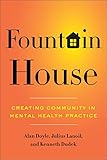Fountain House : Creating Community in Mental Health Practice / Alan Doyle, Kenneth Dudek, Julius Lanoil.
Material type: TextPublisher: New York, NY : Columbia University Press, [2013]Copyright date: ©2013Description: 1 online resource (216 p.) : 6 B&W photosContent type:
TextPublisher: New York, NY : Columbia University Press, [2013]Copyright date: ©2013Description: 1 online resource (216 p.) : 6 B&W photosContent type: - 9780231157100
- 9780231535991
- Community mental health services -- New York (State) -- New York -- History
- Mentally ill -- Deinstitutionalization -- New York (State) -- New York
- Mentally ill -- Institutional care -- United States -- History
- Mentally ill -- Rehabilitation -- New York (State) -- New York
- PSYCHOLOGY / Psychotherapy / Counseling
- 362.22097471 23
- RC439.55 .D69 2013
- online - DeGruyter
- Issued also in print.
| Item type | Current library | Call number | URL | Status | Notes | Barcode | |
|---|---|---|---|---|---|---|---|
 eBook
eBook
|
Biblioteca "Angelicum" Pont. Univ. S.Tommaso d'Aquino Nuvola online | online - DeGruyter (Browse shelf(Opens below)) | Online access | Not for loan (Accesso limitato) | Accesso per gli utenti autorizzati / Access for authorized users | (dgr)9780231535991 |
Frontmatter -- Contents -- Acknowledgments -- Introduction. Social-Ecological Resilience and Law -- One. Wilderness Preserves Still Relevant and Resilient After All These Years -- Two. Bringing Resilience to Wildlife Management and Biodiversity Protection -- Three. Landscape-Level Management of Parks, Refuges, and Preserves for Ecosystem Resilience -- Four. Marine Protected Areas, Marine Spatial Planning, and the Resilience of Marine Ecosystems -- Five. Resilience and Water Governance Addressing Fragmentation and Uncertainty in Water Allocation and Water Quality Law -- Six. Institutionalized Cooperation and Resilience in Transboundary Freshwater Allocation -- Seven. Ecosystem Services, Ecosystem Resilience, and Resilience of Ecosystem Management Policy -- Eight. Maintaining Resilience in the Face of Climate Change -- Nine. Matching Scales of Law with Social-Ecological Contexts to Promote Resilience -- Ten. Incorporating Resilience and Innovation into Law and Policy A Case for Prese Frontmatter -- CONTENTS -- FOREWORD -- INTRODUCTION -- PART I. Working Community -- 1 INSIGHTS FROM ACTIVITY GROUP THERAPY -- 2 REINVENTING FOUNTAIN HOUSE -- 3 CORE PRINCIPLES OF A WORKING COMMUNITY -- PART II. Social Practice -- 4. DEFINING SOCIAL PRACTICE -- 5. TRANSFORMATIONAL DESIGN -- 6. MOTIVATIONAL COACHING -- 7. ISSUES IN RELATIONSHIPS -- Afterword. A PLACE FOR RECOVERY IN THE COMMUNITY -- ACKNOWLEDGMENTS -- CHRONOLOGY -- GLOSSARY -- NOTES -- REFERENCES -- INDEX
restricted access online access with authorization star
http://purl.org/coar/access_right/c_16ec
Often people with mental illness feel alone in society, with no place to go and little hope. Their isolation can be further perpetuated through typical approaches to treatment, such as case management and psychotherapy.Since 1948, the Fountain House "working community" has worked to address the isolation and social stigmatization faced by people with mental illness. This volume describes in detail its evidence-based, cost-effective, and replicable model, which produces substantive outcomes in employment, schooling, housing, and general wellness. Through an emphasis on personal choice, professional and patient collaboration, and, most important, "the need to be needed," Fountain House demonstrates that people with serious mental illness can not only live but also contribute and thrive in society.The authors also explore the evolution of Fountain House practice, which is grounded in social work and psychiatry and informs current strength-based and recovery methodologies. Its inherent humanity, social inclusivity, message of personal empowerment, and innovation-a unique approach on behalf of people suffering from mental illness-have led to the paradigm's worldwide adoption.
Issued also in print.
Mode of access: Internet via World Wide Web.
In English.
Description based on online resource; title from PDF title page (publisher's Web site, viewed 02. Mrz 2022)


